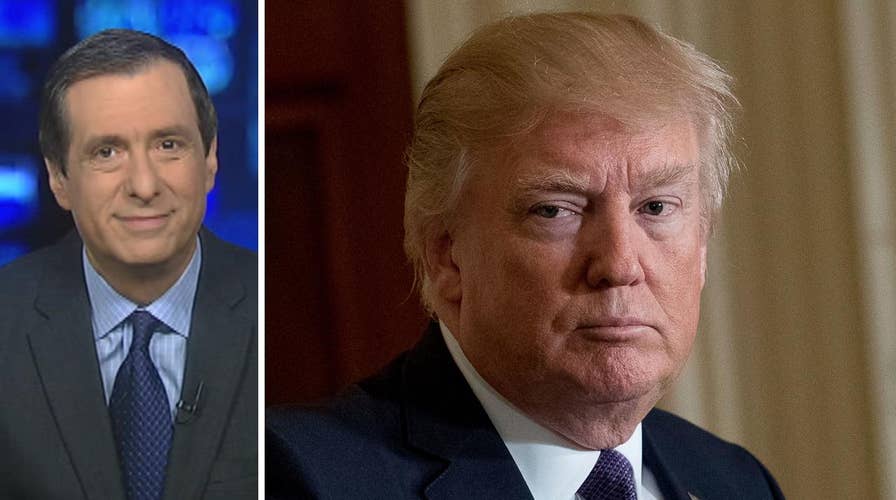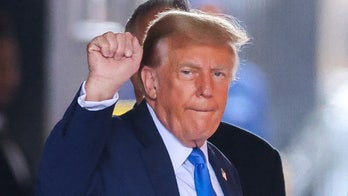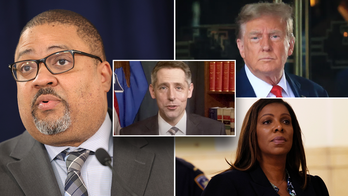Kurtz: Why the press is liking the ‘New’ Trump
'Media Buzz' host weighs in on why the press labeling the President as a 'flip-flopper' could be a sign that the realities of his office are starting to sink in
The media are suddenly awash in stories about Donald Trump being a flip-flopper.
And there is a deep divide over whether this renders him a prevaricator or a pragmatist.
The knee-jerk press reaction to any politician branded with the flipper label is that the person is inconsistent and insincere, lacking a core set of principles.
In Trump’s case, there’s a scolding quality to the coverage: He promised to do all this crazy stuff in the campaign, now he’s had a collision with reality.
Never mind that every president has to abandon certain promises when confronted with the challenges of being commander-in-chief. Barack Obama said he would close Gitmo, and it’s still open. And by the way, Obama was opposed to gay marriage when he ran in 2008. But the spate of Trumpian reversals in the last 10 days is being portrayed as head-spinning.
At the same time, many journalists and commentators are welcoming Trump’s change of heart on a spate of key issues. He is moving in a more moderate direction, which is precisely what they want. He is putting his presidency more in line with the Washington consensus, which is exactly what they had hoped for.
Here’s a rule of thumb: When an office-holder flips toward what the media deem a more extreme position, he is pandering or selling out. When the official flips toward a more moderate stance, he is growing and evolving.
I knew when the president bombed Syria in retaliation for the chemical attack, after having campaigned on an American First platform, that he would be accused of doing a 180. It was delayed a bit by the shock and awe of the Tomahawk strikes. Then, in rapid succession, Trump said that China was not a currency manipulator. That NATO was not obsolete. That the Ex-Im Bank serves a valuable function.
Trump tries to explain some of this away by saying, for instance, that NATO is improving. He has been told that China has stopped manipulating his currency, but also may realize he needs Beijing to pressure North Korea on the nuclear front.
I understand that some conservatives feel that Trump is going back on his word, but most are inclined to cut him some slack.
Still, isn’t having a president who listens and takes advice a good thing?
He threw out a lot of red meat during the campaign, such as saying he’d bring back torture as a tactic against terrorists. But his Pentagon chief, Jim Mattis, has talked him out of that.
The New York Times casts Trump as a novice who is learning the complexities of governing:
“What made sense on the campaign trail may have little bearing on reality in the Oval Office, and the education of a president can be rocky even for former governors or senators. For Mr. Trump, the first president in American history never to have served in government or the military, the learning curve is especially steep.
“The past week has made that abundantly clear. He discovered that President Vladimir V. Putin of Russia may not be the ‘best friend’ he imagined and that staying out of the civil war in Syria was harder than he assumed. He acknowledged that 10 minutes of listening to China’s president made him realize he did not fully understand the complexity of North Korea. He dropped his opposition to the Export-Import Bank after learning more about it. And he said he no longer thought NATO was ‘obsolete.’”
A Times editorial makes a nod in this direction, saying “some commentators point to the comforting possibility that his reversals mean that Mr. Trump is growing in office.” Then the paper discards that: “But then you’d have to overlook the nasty positions he’s stuck to.”
We also see favorable media reviews for Gary Cohn, head of Trump’s National Economic Council. Contrast this Washington Post profile of the former Goldman Sachs president with the way that Steve Bannon is portrayed.
Cohn is pushing “a centrist vision” and courting “bipartisan support on some of Trump’s top agenda items such as tax reform and a $1 trillion infrastructure plan.
“The growing strength of Cohn and like-minded moderates was on display this week as Trump reversed himself on several high-profile issues — including a less confrontational approach to China, an endorsement of government subsidies for exports and the current leadership of the Federal Reserve. The president’s new positions move him much closer to the views of Cohn and others on Wall Street, not to mention mainstream Republicans and Democrats.”
The “alliance of moderates” in the White House is therefore beating the “hardcore conservatives” led by Bannon.
The word choices—“centrist,” “bipartisan,” “mainstream,” “less confrontational”—reflects the kind of stuff that the media love.
Mike Allen at Axios went so far as to declare that “Operation Normal achieved supremacy,” and “a new phase of Trump's presidency begins:
“Centrist forces led by Jared Kushner and Ivanka Trump were ascendant, now are dominant.
“Conservatives should have seen this coming. Trump goes where the applause is loudest. If that means being a full-throated birther, fine! If that means inciting hysterics about Mexicans, game on! If that means hugging NATO or smiling at corporate cronyism, Trump's your man! It would be a hoot if he came full circle and morphed into Michael Bloomberg.”
I don’t think this is a matter of applause. Donald Trump's presidency got off to a rocky start and he is making adjustments, as any CEO would. If he starts racking up accomplishments, the talk of flips and flops will soon fade.





